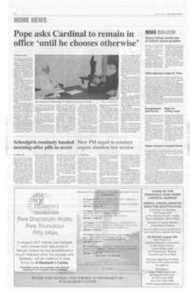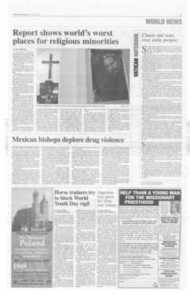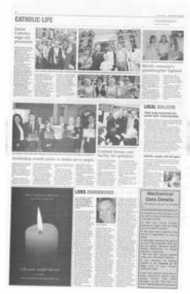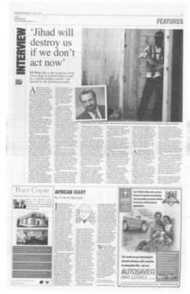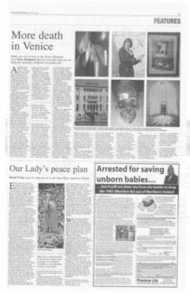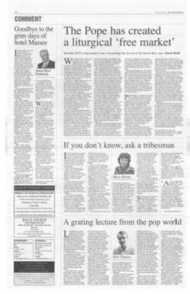Page 1, 13th July 2007
Page 1
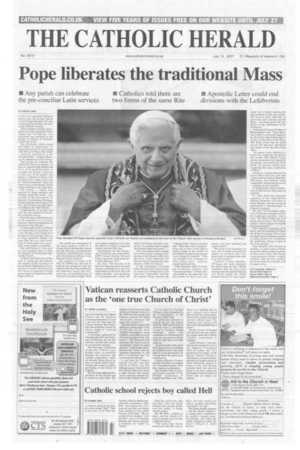
Report an error
Noticed an error on this page?If you've noticed an error in this article please click here to report it.
Tags
Share
Related articles
Bishop Conry Rejects Traditional Mass Request
Bring In Traditionalists To Save Dying Parishes, Urges...
Lefebvrists Break Off Vatican Talks
The Traditionalist Who Became A Revolutionary
Pope Wants Traditional Masses In Every Parish, Says...
Pope liberates the traditional Mass
• Any parish can celebrate 51 Catholics told there are • Apostolic Letter could end
the pre-conciliar Latin services two forms of the same Rite divisions with the Lefebvrists
BY FREDDY GRAY
IN THE most important liturgical reform since the Second Vatican Council, Pope Benedict XVI has swept away restrictions on traditional Catholic worship.
After months of intense speculation, the Pope's Apostolic Letter, Summorum Pontificum, was published last weekend to the delight of millions of Catholics around the world.
The document, which comes into effect on September 14, means that any priest can use the 1962 Missal of Pope John XXIII formerly referred to as the Tridentine Rite without obtaining the permission of his bishop.
Any parish can celebrate the traditional Mass on Sunday, so long as a group of the faithful ask for it. If no qualified priest is available, the bishop is expected to find one. If he cannot, the matter is referred to Rome. The document also makes provision for "personal parishes" under the supervision of the bishop, which mainly celebrate in the older form.
The ruling which was opposed by some cardinals and bishops around the world also extends to the Sacraments of Baptism, Confirmation, Marriage, Penance and the Anointing of the Sick, all of which can take place according to the 1962 Missal.
Communities of monks and nuns are also entitled to choose the traditional liturgy.
Pope Benedict said that the aim of the document was to bring about an "interior reconciliation in the heart of the Church".
In a four-page letter to bishops accompanying the document, he wrote that the Latin Church does not have an Old and New Rite, as so often supposed. Rather. the Latin Rite has two valid forms, both of which should be as accessible to the faithful as possible.
The publication is a key part of a far-reaching drive to raise the standard of worship throughout the Church.
In March the Pope stressed the need to emphasise the sanctity and dignity of the Eucharist in his Apostolic Exhortation, Sacramentum Caritatis. And next year the Vatican is expected to bring out an improved translation of the English Missal. One significant consequence of the motu proprio could be a reconciliation between the Vatican and the followers of Archbishop Lefebvre, who broke from Rome after the liturgical reforms of the Second Vatican Council.
The Lefebvrist Society of St Pius X (SSPX) has said that it will not be reconciled with the Vatican until the Church liberates the traditional liturgy and overturns the excommunications of four of its founding bishops. With one of these conditions now met, the SSPX is willing to negotiate further with the Holy See.
On Saturday, the day Summorum Pontificwn was made public, SSPX leader Bishop Bernard Fellay expressed "deep gratitude" to Pope Benedict XVI.
He said: "The Society of St Pius X wishes that the favourable climate established by the new dispositions of the Holy See will make it possible after the decree of excommunication which still affects its bishops has been withdrawn to consider more serenely the disputed doctrinal issues."
The mom proprio has already provoked alarm among some groups in the Church. which feel the move could undermine the Second Vatican Council and cause disunity within the Church.
In the document's covering letter, Benedict XVI was at pains to assure his bishops that such fears were "unfounded" and that the modem liturgy remains the "ordinary form-. But he conceded that "there have been exaggerations and at times social aspects unduly linked to the attitude of the faithful attached to the ancient Latin liturgical tradition". This was thought to be a reference to ultra-conservative opinions among traditionalists.
Pope Benedict called on bishops to exercise "charity" and "pastoral prudence" to help solve such problems. He added that "the new norms do not in any way lessen your own authority and responsibility".
The point of the document, he said. was "to make every effort to enable for all those who truly desire unity to remain in that unity or to attain it anew."
Cardinal Cormac MurphyO'Connor this week welcomed the call for unity. He said: "We are confident that the provisions already made throughout England and Wales under the indult granted back in 1971 go a signif icant way towards meeting the requirements of the new norms. We foresee little difficulty in receiving and carrying out the Pope's teaching about the two forms of the celebration of the Eucharist."
Archbishop Vincent Nichols of Birmingham said: "Pope Benedict's letter is a powerful appeal to us all to have open hearts when it comes to the form of the Mass. The Pope insists that we speak not of 'old' and 'new' rites but of two forms of the one Rite of the Mass.
"In recent years, whenever a priest has asked for the private use of the 1962 Missal I have given permission and, generally speaking, provision has been made for groups which have requested this same celebration of Mass."
However, a spokesman for the Latin Mass Society said that "other dioceses such as Plymouth. Wrexham and Salford make completely inadequate provision verging on non-existent".
In traditionalist circles. Summorum Ponnficum has been received joyfully.
Fr John Emerson, regional superior of the traditionalist Priestly Fraternity of St Peter in Great Britain, said the document represented a "breakthrough" in Catholic worship.
He said: "It is no longer a question of bishops making provision for traditional worship that is over. The Holy Father has now made the provision. The bishops simply cannot ignore or override the motu proprio.
The Priestly Fraternity of St Peter and the Institute of Christ the King Sovereign Priest have arranged special training sessions to teach priests how to celebrate the traditional liturgy in light of the mom proprio.
Pope Benedict XVI invited all bishops to report back to Rome about the effects pf the document in three years' time. But Church commentators think it highly unlikely that the new freedom given to traditional Catholics will be taken away.
Full coverage: Pages 2-3 Stuart Reid: Page 10 Alcuin Reid: Page 10 Editorial Comment: Page 11
blog comments powered by Disqus





